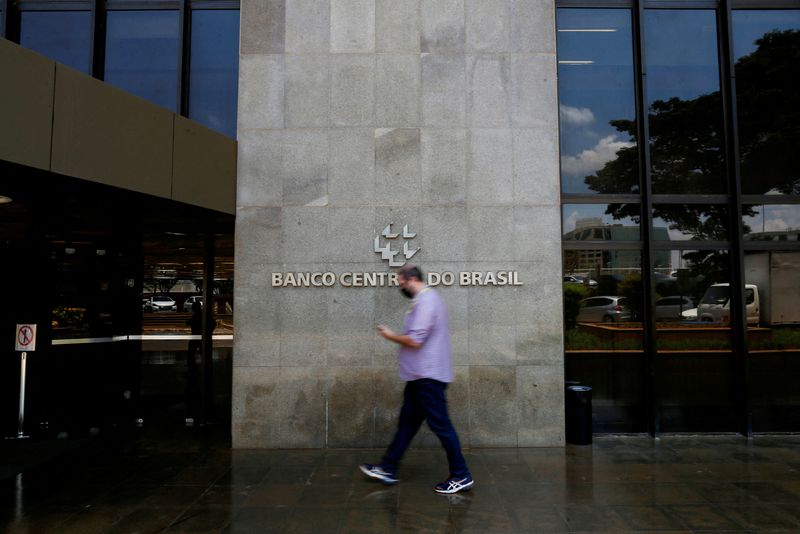By Luana Maria Benedito and Gabriel Burin
SAO PAULO/BUENOS AIRES (Reuters) - Brazil's central bank is set to keep its key interest rate unchanged on Wednesday for the last time in a policy hold period that began last year, according to a Reuters poll of economists who expect the first rate reduction to come soon.
Analysts and investors are looking for signals of an exit from strict policy amid a growing urge to lighten credit conditions in Latin America's No. 1 economy, which in 2021 and 2022 underwent a surprisingly aggressive tightening campaign that added 1,175 basis points of hikes to fight inflation.
The rate-setting committee of Banco Central do Brasil (BCB), known as Copom, will hold the benchmark Selic rate at 13.75% -its highest since 2017 - for the seventh and last meeting on Wednesday, according to all 47 economists polled June 12-15.
"Given the accelerated decline of inflation, which has put the annual rate inside the target's upper range, the probability of rate cuts is increasing for this year," said Alfredo Coutino, Latam director at Moody's (NYSE:MCO) Analytics.
But he added "the central bank will leave the door open to see and wait how conditions develop."
The BCB's upper target range for inflation is 3.25%-4.75%.
By contrast the U.S. Federal Reserve - which started raising rates much later - paused its rate hiking campaign this month but flagged more tightening was likely.
BCB Governor Roberto Campos Neto indicated this week that a recent improvement in domestic markets had opened the door for a shift in monetary policy, a significant change in his usually-hawkish rhetoric.
The comments came after a sharper-than-expected inflation slowdown in May prompted a large drop in Brazilian rate futures that supported an increasingly benign picture for consumer prices. In May 12-month inflation hit its lowest level in more than two years and dropped below the 4% mark for the first time since late 2020.
In reply to a separate question on the specific month and size of a potential first rate cut, a majority of 36 of 40 respondents viewed such a move taking place in the third quarter, with 20 pointing to August and 16 to September.
Among those who saw initial action in August, 13 expected a cut of 25 basis points and three a deeper one, of 50 basis points. Three did not give numeric forecasts, while one of them viewed equal chances for 25 and 50 basis points that month.
Of 16 contributors who chose September, nine saw a reduction of 50 basis points, six said a 25 basis points decrease, and one did not offer an estimate.

Among the rest, three expected a move in November and one in January.
(Other stories from the Reuters global economic poll)
(Reporting and Polling by Gabriel Burin in Buenos Aires and Luana Benedito in Sao Paulo; Editing by Ross Finley and Frances Kerry)